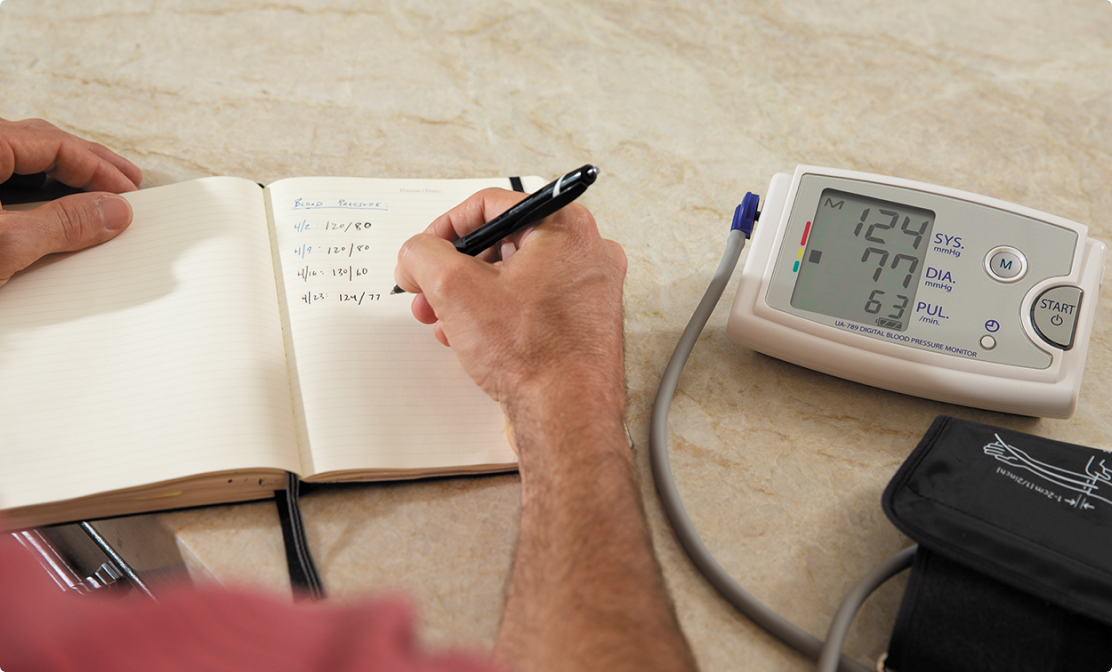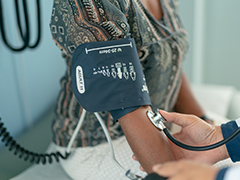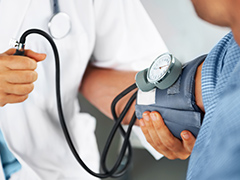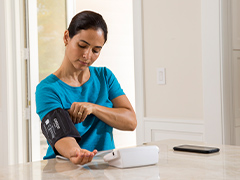Hypertension
Programs and resources to help you prevent and manage hypertension.

Helping you control your blood pressure
One in three American adults has hypertension. That’s nearly 75 million people. We’re committed to helping you manage your blood pressure so you can have a healthier heart.
Download the GuideGet a free blood pressure monitor
If you have hypertension, you can get help monitoring your blood pressure at home. As part of our Hypertension Management Program, you may be eligible for a free digital blood pressure monitor.*
*You must be the contract holder or spouse, 18 or older, to receive this benefit.

What is hypertension?
Hypertension, also known as high blood pressure, is a condition that occurs when the force of blood pushing against your blood vessels is too high.
- Heart disease or heart failure
- Stroke
- Kidney disease
- Hardening of the arteries (atherosclerosis)
Know your numbers
The best way to know if you have high blood pressure is to get your blood pressure checked on a regular basis. A normal “healthy” blood pressure reading is 120/80 mmHg or less.
- Systolic pressure: The pressure when the heart beats while pumping blood (the top number)
- Diastolic pressure: The pressure when the heart is at rest between beats (the bottom number)
- Normal: Less than 120 mmHg / Less than 80 mmHg
- Elevated (prehypertension): 120–129 mmHg / Less than 80 mmHg
- High Blood Pressure (Stage 1): 130–139 mmHg / 80–89 mmHg
- High Blood Pressure (Stage 2): 140 mmHg or higher / 90 mmHg or higher
- Hypertensive Crisis (Stage 3): Higher than 180 mmHg / Higher than 120 mmHg
Risk Factors
High blood pressure is often called the “silent killer” because it usually has no signs or symptoms. That’s why it’s so important to know your risk factors.
- Age: Risk of high blood pressure increases as you age; 68% of women age 65-74 have high blood pressure compared to 62% of men.
- Sex: Until age 64, men are more likely to have high blood pressure than women. At age 65 and older, women are more likely to have high blood pressure.
- Ethnicity: African Americans develop high blood pressure more often than people of any other racial background in the United States.
- Family History: High blood pressure tends to run in families.
- Being overweight or obese: Body Mass Index (BMI) greater than 25 increases your risk as extra weight adds more stress on your body
- Lack of exercise: Exercise is good for your heart and lowers your risk of high blood pressure
- Unhealthy diet: Eating meals high in salt (sodium), calories, fats and sugar increases your risk
- Drinking too much alcohol: More than 1 drink a day for women and more than 2 drinks a day for men may elevate your blood pressure over time
- Smoking & using tobacco: Tobacco can increase your blood pressure and cause damage to your heart and blood vessels over time
- Stress: Stressful situations or life stressors can contribute to high blood pressure.
- Chronic medical conditions: High cholesterol, diabetes, kidney disease and sleep apnea are medical conditions that increase your risk of high blood pressure
Managing your blood pressure
Here are steps you can take to maintain a healthy heart.
The best way to know if you have high blood pressure is to see your doctor regularly so they can take a blood pressure reading. As a member, blood pressure screenings are covered when you see a Preferred provider.
If your doctor prescribes medication to help lower your blood pressure, take it as directed. As a member, you get reduced copays on generic, cholesterol-lowering statin drugs.
Monitor your blood pressure at home every day or as directed by your doctor. Keep a journal of your readings to share with your doctor.
- Limit your salt (sodium) intake
- Consider the DASH (Dietary Approach to Stop Hypertension) eating plan
- Lose weight & increase your physical activity
- Limit your alcohol & quit smoking
- Manage your stress








